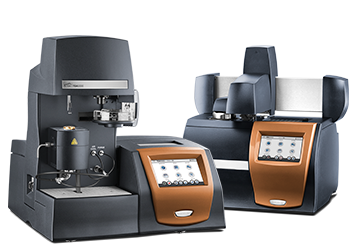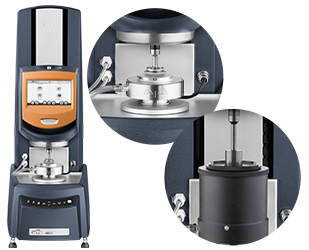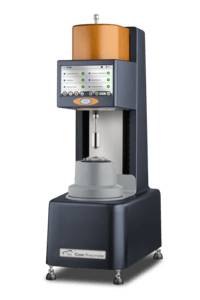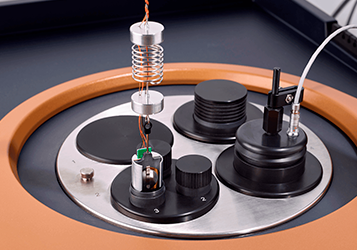Combine Multiple Instruments to Develop More Powerful and Reliable Batteries
TA Instruments | Waters have put together three lab packages designed specifically for your battery lab. Whether you are testing thermal stability to develop safe and efficient batteries, your battery slurry formulation, or whole cell battery testing these instrument packages will complete your lab.
THERMAL STABILITY PACKAGE
Thermal Stability for Safe, Efficient Batteries
One of the most critical parameters in material selection is thermal tolerance. Battery materials must reliably operate under normal environmental conditions, typically between -20 °C to 60 °C, without malfunction or thermal runaway. Battery researchers use thermal analysis to test the thermal tolerance and stability of battery materials and whole cells under realistic application conditions.
Improve battery performance through optimized material selection and processing
Differential Scanning Calorimetry (DSC) aids in material characterization by providing melting and crystallization temperatures critical for proper material development. DSC helps battery labs:
- Process binder materials with sufficient adhesive properties
- Ensure thermal stability in electrolyte freezing for low-temperature performance
- Understand battery degradation and ensure safety
After choosing the right binder and active material, ensure the coating is uniform to support the thermal stability of the battery. Thermogravimetric Analysis (TGA) enables the user to run quality control checks by measuring critical parameters like thermal stability, solvent content, and binder and additive composition. Quantifying these qualities helps streamline the manufacturing process, reducing errors and costs.

BATTERY SLURRY PACKAGE
Accelerate Electrode Material Development With Advanced Rheological Capabilities
In the race to develop and manufacture high-performance batteries, slurry formulation and processing are key to successful outcomes. A slurry’s rheological properties are critical to the coating process, directly impacting electrode quality, overall battery energy density, electrochemical performance, and ultimate cost.
The Discovery Hybrid Rheometer empowers scientists to develop successful anode and cathode slurries
- Optimize behavior at each manufacturing stage including storage, mixing, and coating
- Characterize slurries’ internal network of conductive material under process conditions using Rheo-Impedance Spectroscopy
- Evaluate properties of dry ingredients, and develop solvent-free dry electrode coatings using Powder Rheology
- Expand beyond slurries to all battery materials, ranging from low viscosity electrolytes to solid separator materials, using the versatile Discovery Hybrid Rheometer
The typical DHR configuration for battery slurries couples the Rheo-IS Accessory with the Advanced Peltier Plate and 40 mm plate geometry. And the Powder Rheology Accessory is a must-have for any lab formulating their own battery slurries from dry powders.

Ensure Consistent Slurries to Maximize Battery Production
Successful production of dependable batteries begins with the electrode slurry. Validate that every batch of anode and cathode slurry is prepared correctly and consistently to ensure proper coating behavior is achieved every time.
The Discovery Core Rheometer provides a streamlined solution to ensure electrode quality
- Evaluate slurry flow behavior during the coating process shear rates
- Verify sufficient mixing using viscoelastic measurements
- Identify outliers upstream and take corrective action, minimizing scrapped batteries and loss of time and materials
The Discovery Core Rheometer offers a unique user experience guiding operation, empowering every user to collect precise rheological data with a workflow designed for fast-paced production labs. Configure your Discovery Core Rheometer with the Peltier Concentric Cylinder and a DIN rotor for quick and easy sample handling.

WHOLE CELL TESTING PACKAGE
Non-Destructive Whole Cell and Component Testing Package
Developing successful battery technology requires accurate performance predictions and safety assurance. TAM battery calorimeters allow for non-destructive testing of whole battery cells and components under application-specific environmental conditions. Battery cells can be recovered for follow-up analyses, saving time and resources.
TAM calorimeters offer battery users:
- Versatility to handle a wide range of battery sizes, throughputs, and environmental conditions
- Battery component compatibility testing for informed material assessment
- Charge-discharge testing from one software interface
- Test different battery shapes, sizes, and form factors simultaneously under accurate environmental conditions and temperature
- Sensitivity to elucidate the smallest electrochemical reactions that can reduce battery life


